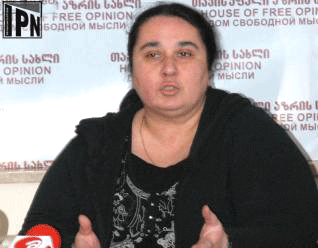Non-Governmental Organization Protests Against Current Situation in Pretrial Detention
November 16, 2009
Gela Mtivlishvili, Kakheti

The non-governmental organization Former Political Prisoners-For Human Rights protests against the current situation in pretrial detention settings. The chairperson of the organization, Nana Kakabadze, said that the situation is very hard in most part of detention settings. There are neither toilets nor central heating; the detention settings do not have yards to walk; inmates cannot preserve hygiene; their nutrition is not well organized. Inmates sleep on boards, or even in several cases on concrete floor. This problem is very urgent for the detainees sentenced to full administrative imprisonment.
There is 37 pretrial detention settings in Georgia. Two of them are in Tbilisi, the rest being located in the regions. Public Defender’s Office monitors the situation in the pretrial detention settings. According to the ombudsman’s office, the situation is extremely urgent in detention settings of Samtskhe-Javakheti, Kvemo Kartli and Guria. Sanitary situation is the most unsatisfactory in the detention settings in Akhaltsikhe, Akhalkalaki and Borjomi. The detainees do not get hygiene items and there are no minimal conditions for inmates to preserve their personal hygiene. Water-supply and central heating systems either do not exist or are in poor conditions in many detention settings. There are 14 iron beds in 6 cells of Kvareli pretrial detention setting and the building does not have windows. There are 12 iron beds in 3 cells of Sighnaghi pretrial detention setting; and in Kutaisi detention setting inmates sleep on 34 wooden boards in 8 cells.
Law of Georgia on Imprisonment defines that every prisoner shall enjoy one-hour walk in fresh air. Since most detention settings do not have yards, the detainees are locked in the cells all day long.
Committee for the Torture Prevention of the CoE estimates that lack of fresh air and poor illumination creates conditions for degrading treatment. In accordance to the Rule 17 of the European Regulation of Prison adopted by the Committee of Ministers of the CoE, sanitary spots shall be equipped and located adequately in order to enable every prisoner to satisfy natural requirements properly in clean environment. In accordance to the Rule 10 of the UN Minimal Standards, every place used by prisoners – particularly bedrooms – shall comply with sanitary requirements. Besides that, climate, height of the cells, minimal space, illumination and ventilation shall be placed under particular attention. Despite international laws, ventilation systems can’t be found in Georgian pretrial detention settings. There is not even natural ventilation in the cells of pretrial detention settings of Baghdati, Chiatura, Samtredia, Lentekhi and Ambrolauri districts. Windows are boarded up in Baghdati pretrial detention setting, in Chiatura detention setting the windows are completely sealed up; detention settings in Ambrolauri and Lentekhi districts do not have windows at all.
Pretrial detention settings in Tkibuli, Samtredia, Lentekhi and Ambrolauri districts do not have investigation rooms; inmates therefore meet their attorneys in the working rooms of the prison personnel. Tsageri district pretrial detention setting does not have any isolated space. The cell is isolated from the working room of the Tsageri district police station with bars. One board is used for bed. If more than one person is detained in the detention setting, the detainees have to sleep on the floor.
It must be noted, that except Tbilisi pretrial detention setting, other detention settings in Georgia does not have doctors. Employees of the setting therefore have to examine themselves the detainees.
According to the public defender of Georgia Giorgi Tughushi, inmates in pretrial detention settings still were physically assaulted in the first part of 2009.
“In some cases, witnesses confirm the harassment facts. For example, people without masks beat Nugzar Otanadze in the pretrial detention setting with rubber truncheons; during beating he was periodically taken out to threw water on his head,” said the public defender.
Currently, the pretrial detention settings are subordinated to the MIA. The inmates are placed in the settings for 48-72 hours before they are charged for the crime and the court discusses their liability. If the detainees are sentenced to two-month pretrial detention they are moved to the jail of the penitentiary department. Besides the people detained for criminal offence, people convicted for administrative offence are also placed in the pretrial detention settings. Before August 18, 2009 maximum term for administrative offence was 30 days. On August 18, 2009 new rules were put in forces for administrative offences after August 18, 2009. In accordance to the amendments to the law the maximum duration for the administrative imprisonment has increased 3 times and has reached 90 days.
“Living in the above-mentioned conditions during 3 months is equal to the torture, inhuman and degrading treatment,” said human rights defender Nana Kakabadze.
According to the MIA, total 9 358 people were placed in the pretrial detention settings of the main department for human rights and monitoring within the MIA from January 1 to July 1 of 2009; among them 2 748 were injured. Only 16 people filed complaints against police
News
December 13, 2023
Ethnic minorities outside the peace dialogue
November 6, 2023
‘Peace’ agenda of political parties
Popular
Articles
February 13, 2024



